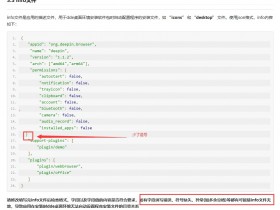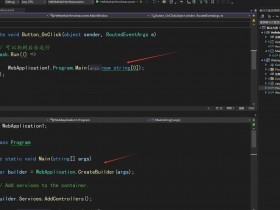- A+
所属分类:.NET技术
判断两条线段是否相交
主要用到了通过向量积的正负判断两个向量位置关系
向量a×向量b(×为向量叉乘),若结果小于0,表示向量b在向量a的顺时针方向;若结果大于0,表示向量b在向量a的逆时针方向;若等于0,表示向量a与向量b平行
主要代码参考自文末链接,但是他并没有给出跨立检验函数的具体内容,因此补充了一下放在下面
using System; using System.Collections.Generic; using System.Windows; using System.Linq; using System.Text; using System.Threading.Tasks; namespace lineTest { class Program { public struct Point { public double X; public double Y; public Point(double x, double y) { X = x; Y = y; } } static void Main(string[] args) { Point a = new Point(0, 0); Point b = new Point(100, 100); Point c = new Point(100,0); Point d = new Point(50,49); var result = IsIntersect(a, b, c, d); } public static Point? GetIntersection(Point lineAStart, Point lineAEnd, Point lineBStart, Point lineBEnd) { double x1 = lineAStart.X, y1 = lineAStart.Y; double x2 = lineAEnd.X, y2 = lineAEnd.Y; double x3 = lineBStart.X, y3 = lineBStart.Y; double x4 = lineBEnd.X, y4 = lineBEnd.Y; //equations of the form x=c (two vertical lines) if (x1 == x2 && x3 == x4 && x1 == x3) { return null; } //equations of the form y=c (two horizontal lines) if (y1 == y2 && y3 == y4 && y1 == y3) { return null; } //equations of the form x=c (two vertical lines) if (x1 == x2 && x3 == x4) { return null; } //equations of the form y=c (two horizontal lines) if (y1 == y2 && y3 == y4) { return null; } double x, y; if (x1 == x2) { double m2 = (y4 - y3) / (x4 - x3); double c2 = -m2 * x3 + y3; x = x1; y = c2 + m2 * x1; } else if (x3 == x4) { double m1 = (y2 - y1) / (x2 - x1); double c1 = -m1 * x1 + y1; x = x3; y = c1 + m1 * x3; } else { //compute slope of line 1 (m1) and c2 double m1 = (y2 - y1) / (x2 - x1); double c1 = -m1 * x1 + y1; //compute slope of line 2 (m2) and c2 double m2 = (y4 - y3) / (x4 - x3); double c2 = -m2 * x3 + y3; x = (c1 - c2) / (m2 - m1); y = c2 + m2 * x; } if (IsInsideLine(lineAStart, lineAEnd, x, y) && IsInsideLine(lineBStart, lineBEnd, x, y)) { return new Point(x, y); } //return default null (no intersection) return null; } private static bool IsInsideLine(Point start, Point end, double x, double y) { return ((x >= start.X && x <= end.X) || (x >= end.Y && x <= start.Y)) && ((y >= start.Y && y <= end.Y) || (y >= end.Y && y <= start.Y)); } public static bool IsIntersect(Point p1, Point p2, Point q1, Point q2) { //排斥试验,判断p1p2在q1q2为对角线的矩形区之外 if (Math.Max(p1.X, p2.X) < Math.Min(q1.X, q2.X)) {//P1P2中最大的X比Q1Q2中的最小X还要小,说明P1P2在Q1Q2的最左点的左侧,不可能相交。 return false; } if (Math.Min(p1.X, p2.X) > Math.Max(q1.X, q2.X)) {//P1P2中最小的X比Q1Q2中的最大X还要大,说明P1P2在Q1Q2的最右点的右侧,不可能相交。 return false; } if (Math.Max(p1.Y, p2.Y) < Math.Min(q1.Y, q2.Y)) {//P1P2中最大的Y比Q1Q2中的最小Y还要小,说明P1P2在Q1Q2的最低点的下方,不可能相交。 return false; } if (Math.Min(p1.Y, p2.Y) > Math.Max(q1.Y, q2.Y)) {//P1P2中最小的Y比Q1Q2中的最大Y还要大,说明P1P2在Q1Q2的最高点的上方,不可能相交。 return false; } //跨立试验 var crossP1P2Q1 = VectorCross(p1, p2, q1); var crossP1Q2P2 = VectorCross(p1, q2, p2); var crossQ1Q2P1 = VectorCross(q1, q2, p1); var crossQ1P2Q2 = VectorCross(q1, p2, q2); bool isIntersect = (crossP1P2Q1 * crossP1Q2P2 >= 0) && (crossQ1Q2P1 * crossQ1P2Q2 >= 0); return isIntersect; } private static double VectorCross(Point p1, Point p2, Point p3) { Vector vectorP1 = new Vector(p1.X, p1.Y); Vector vectorP2 = new Vector(p2.X, p2.Y); Vector vectorP3 = new Vector(p3.X, p3.Y); Vector vectorP1P2 = Vector.Subtract(vectorP2, vectorP1); Vector vectorP1P3 = Vector.Subtract(vectorP3, vectorP1); return Vector.CrossProduct(vectorP1P2, vectorP1P3); } } }
参考
https://blog.csdn.net/weixin_33973609/article/details/93580049
https://www.cnblogs.com/tuyang1129/p/9390376.html




